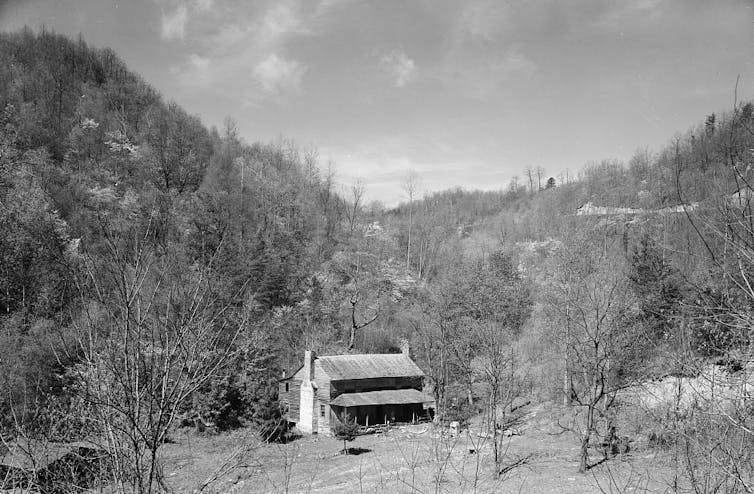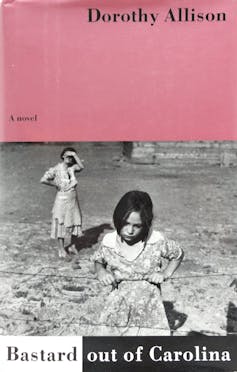Dorothy Allison, who died on Nov. 5, 2024revealed her first novel, “Bastard Out of Carolina,” in 1992, when she was 42 years earlier.
She mined her private life to craft the semi-autobiographical work, which grew to develop into a finalist for the Nationwide E-book Award.
Rising up poor in Greenville, South Carolina, Allison endured abuse of every kind sooner than becoming the first in her family to finish highschool and faculty. As a lesbianshe confronted additional challenges and hurdles. Sooner than she achieved literary fame alongside together with her first novel, Allison ran a feminist bookstore and a women’s coronary heart. She was broke when she lastly supplied “Bastard Out of Carolina.”
To me, Allison is a shining exception in a protracted line of authors who’ve tried to put in writing down about poverty nonetheless fail to exactly seize it.
In my e-book “Poor Points: How These with Money Depict These with out It,” I ingredient the type of what I identify “poornography” – tales written about poor people by people who don’t have firsthand experience being poor themselves.
Most readers are possibly conversant within the common tropes in these works: violence, sexual abuse, behavior, filth and degradation. Allison was decidedly not in that camp.
She broke that mould by discovering magnificence in her impoverished surroundings and specializing in love, humor and family bonds.
Magnificence in a hopeless place
Although “Bastard out of Carolina” lastly provides with bodily and sexual abuse – which, in reality, is simply not confined to poor people – this merely constitutes one facet of a broader emotional and bodily panorama.
Allison’s hometown of Greenville may be the setting of the novel – and it’s a spot that the novel’s youthful narrator, Bone, describes as “basically essentially the most beautiful place on the planet.” She offers:
“Black walnut bushes dropped their green-black fuzzy bulbs on Aunt Ruth’s matted backyard, earlier the place their knotty roots rose up out of the underside similar to the elbows and knees of dirty kids suntanned darkish and lined with scars. Weeping willows marched all through the yard, following every wandering stream and ditch, their prolonged whiplike fronds making rents that sheltered sweet-smelling beds of clover.”
Extreme hunger, nonetheless, is unique to poverty, and one factor that poor writers sometimes recall with a type of vividness that will escape middle-class or wealthy writers.
“Hunger makes you burdened,” Allison writes. “You dream about meals, magical meals, well-known and awe-inspiring, the one piece of meat, the exact type of buttery corn, tomatoes so ripe they break up and sweeten the air, beans so crisp they snap between the tooth, gravy like mother’s milk singing to your bloodstream.”
In “Bastard out of Carolina,” Allison doesn’t have enjoyable hunger. Nevertheless she is able to uncover humor in it and current how laughter may be utilized as a coping mechanism.
Throughout the novel, when Bone complains about being hungry, her mother recounts her private childhood: Once more then, there was “precise hunger, hunger of days with no expectation that there would ever be biscuits as soon as extra.” And thru these cases she and her siblings would concoct fantastical tales of bizarre dishes: “Your aunt Ruth on a regular basis talked about frogs’ tongues with dew berries. … Nevertheless Raylene acquired the prize alongside together with her recipe for sugar-glazed turtle meat with poison greens and scorching piss dressing.”
Humor isn’t used to gloss over the seriousness of poverty. However Allison is raring to stage out that every can exist: They’re all wrapped up in a life lived.

Library of Congress
American delusion
I can’t help nonetheless look at Allison’s work with that of an creator like JD Vance. In his 2016 memoir, “Hillbilly Elegy,” Vance revels in his grandmother’s anger and violence as a sign of her vibrant hillbilly-ness.
Then once more, in “Bastard out of Carolina,” Bone recollects her mother saying flatly, “Nothing to be happy with in taking footage at people for you incorrect.”
So many alternative writers about poverty have characters who pine for the material comforts promised by the American Dream, whether or not or not it’s Clyde Griffiths in Theodore Dreiser’s “An American Tragedy” or George and Lennie in John Steinbeck’s “Of Mice and Males.”

Amazon
Allison’s characters, then once more, research to see by means of this false promise. In a single scene, Bone and her cousin break into the native Woolworth’s.
Beforehand, she had longingly eyed a brimming glass case of nuts. Nevertheless as quickly as she shatters the present case, she realizes “that the case was a sham. There hadn’t been larger than two inches of nuts pressed in opposition to the glass entrance, propped up with cardboard.” Her response: “Low value sons of bitches.”
In a present of sophistication consciousness, Bone lastly detects the false entice of low value commodities. “I regarded … the least bit the problems on present. Junk in all places: sneakers that went to gadgets throughout the rain, clothes that separated on the seams, stale candy, make-up that made your pores and pores and skin get away.”
In distinction, she thinks of the price of the home-canned gadgets made by her aunt. “That was worth one factor. All these items appeared tawdry and ineffective.”
‘Jealous of you for what you purchased’
At one stage, Bone articulates the thought of poornography with out using that point interval. She talks about “the mythology” that plagues poor people:
“Of us from households like mine – southern working poor with extreme costs of illegitimacy and all too many relations who’ve frolicked in jail – we are the individuals who discover themselves seen because the class that does not take care of his or her kids, for whom rape and abuse and violence are the norm. That such assumptions are false, that the rich are merely as liable to abuse their kids as a result of the poor, and that southerners do not have a monopoly on each violence or illegitimacy are realities that are robust to get people to acknowledge.”
In “Bastard out of Carolina,” Bone resents the rich reasonably than admiring them. In a dialog with one amongst her aunts, she says she “hates” them. Apparently, her aunt provides the poor specific particular person’s counterpoint to hate.
“Could very nicely be they’re you sitting up proper right here consuming blackberries … could be they’re jealous of you for what you purchased, afraid of what you will do within the occasion that they stepped throughout the yard.”
Allison reveals readers how class resentment can go every strategies, and the way in which for all of the contempt directed at poor people from the rich and extremely efficient, there might also be a part of envy and fear at play.
